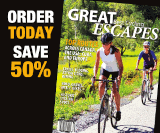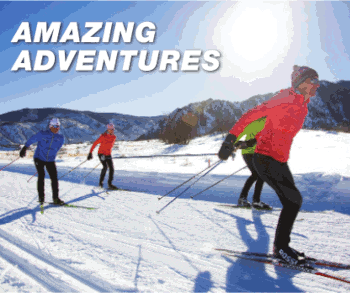March 25, 2011 The NCCSEF invested $43,000 in six 2010-2011 Cross Country Ski Racing Projects with a goal of helping Team Tomorrow become Team Today! One of the investments was in a trip to the Europe Continental Cup (Europa or OPA Cup) Finals in Rogla, Slovenia and Ramsau, Austria, March 7-21. We want to share some thoughts athletes and coaches developed from this trip that will help them better pursue their dreams.
Sylvan Ellefson-Ski and Snowboard Club Vail-Team HomeGrown – Learned:
– Europeans are no more talented than Americans. We train just as hard. We just need to change our mentality about overseas racing.
– A solid, positive group of racers can make a racing experience even better.
– Having support from coaches from all over the US can give you perspectives in a different light for the better.
– Being more accustomed to racing on European turf helps prepare and be more ready for the next time you encounter racing outside of the US.
– Not every day is going to be Extra Blue skiing. When going gets tough and variables you can’t control prevail, you have to learn how to dig deep and find what that motor of yours can actually do.
Noah Hoffmann-US Ski Team-SVSEF/ASPEN – Learned:
– The importance of patience when things aren’t going well or you can’t race because of sickness or injury.
– A ton from watching my fellow teammates. I especially enjoyed the sprint. We have some incredible athletes in this country who have some of the best technique in the world. I can learn a ton from watching them and I’m looking forward to training with them this summer!
– That there is no reason to be scared of athletes from Europe or put them on a pedestal. They are doing the same things we are and they aren’t, as countries, better than us.
– Just how hard the coaches work when they are doubling as wax staff. I am so impressed with the work ethic and dedication of the staff, and I gained a whole new respect for them and their work.
– The importance of being able to ski on all courses and in all conditions. When we first got to Ramsau, I thought I was racing, and I was really nervous about the flatter course and the icy, fast conditions. I don’t know how well I can ski in those conditions. I need to work on those weaknesses and build confidence so that it’s not an issue.
Leif Zimmermann-Bridger Ski Foundation Elite Team – Learned:
– Time change vs. Performance. After traveling to and from Europe many times now, I have been able to develop a routine to help me adjust to all the changes your body has to cope with, then race to the top of your ability (e.g.- large time change, different food, different beds, different snow and climate, ext…) This has been really challenging for me to overcome. Yet definitely something I have improved on!
– Ski and Grind selection. I always learn something new about how my skis and grinds run over in Europe!
– Coaches and Athletes. Working with new coaches and athletes from around the country is always a learning experience! I am 100% confident everyone took something away from this trip that will improve their ability!
– Competitors. I always learn a lot from racing with developing and world cup level athletes from around Europe. From warming up with medal winners, to skiing with other skiers in the race, to seeing how they utilize there technique on different terrain. I take away something every time I’m exposed to these Competitors!
– Enjoyment. For me, after racing for 12 years, sometimes a new “venue” can be very refreshing and also very motivating! I always enjoy experiencing a new country and culture! To have these new experiences, while following my true passion, is something I will keep with me long after I’m not a “ski racer” anymore.
Becca Rorabaugh-APU Nordic Ski Center – Learned:
– Everyone has ups and downs. Some of the girls that seemed unbeatable one day would be in the teens on the result list the next. They didn’t seem upset about it either, they knew that they were capable of more and would show it next time.
– It’s important to be flexible and relaxed. This is something that I noticed during a few trips to Europe: the food probably won’t be familiar and comfortable, the wax team will have a different way of organizing ski work, and the course might not be finalized until the day before. In the end, it’s going to be fine. You can perform well on schnitzel and potatoes, the skis will not ruin your race, and everyone has to do the same course…
– Don’t ski too hard on the first couple of days at altitude after a 10 hour time change! I think I came close to giving myself a cold from that. Even if your training buddy goes fast, you shouldn’t!
– Ski racing is a professional vocation. The European teams really impressed me with their professional manner. Everyone on those teams was on the job at the OPA races. The athletes are there to race, and the techs are there to tech. I am not saying that wax techs shouldn’t get to watch the races too, I know I appreciate Brian, Gus, and Casey cheering out there, but all of the other wax rooms were packed up and moved out by the end of the last race because the techs were packing during the race. They were there to get their stuff done, just like the racers were. It’s a little different from the American perspective because we have trouble seeing skiing as a true vocation; people see full-time athletes like us almost as ski-bums. I think it’s easy to start thinking that skiing is something that we do because we don’t have a bigger or better opportunity because that’s how other people tend to see us. Watching the Euro’s approach to skiing helped to remind me that it’s not.
– It’s really important to practice skiing in all kinds of conditions. Most of the snow that we skied on was not at all like what I have raced on in the US, even the hardwax classic skiing was greasier and trickier. The last day in Ramsau was sloppy and wet klister skiing, something that I hadn’t really practiced until I started training with APU on Eagle Glacier in the summers. Racers in the west and in Alaska need to make sure to find some gnarly training conditions sometimes, because it’s pretty rare to get to race on extra blue hardwax in Europe!
Bryan Fish-Continental Cup Coach-U.S. Ski Team- Learned:
– It is really valuable for clubs and the National Team to work hand-and-hand. Learning happens full circle.
– We have warm conditions in the states, but they typically happen towards the end of the season. This is no different than overseas. Maybe we need to continue skiing and racing later into the year like our counterparts overseas. Seek out these “unfavorable” situations as a learning experience instead of planning away from them.
– A great amount is learned in skiing with and against others of equal or slightly higher level. When I say ski – that means training and competing. There is a huge value in seeing what other successful athletes and teams are doing day in and day out. You pick up a little piece here or there and add it to your tool box.
– There is a learning curve when taking groups from a variety of backgrounds. It is positive, but merging athletes and coaches from a variety of programs takes patience, strong communication and cooperative efforts. It’s an adjustment for all parties, but the end result – can and was totally positive.
– I think US athletes are more familiar with their equipment and racing below the freezing point. I think we should seek out opportunities to develop a level of experience and comfort in warmer conditions.
For more information on NCCSEF, and these and future funding initiatives, and to make your charitable contribution visit www.NCCSEF.org.






![National camp action [P]...](https://null-skitrax.com/wp-content/uploads/2019/08/Duluth-4-2019-08-08-at-10.46.51-AM-300x246.png)
![Matt Liebsch on the CXC Elite Team [P] CXC...](https://null-skitrax.com/wp-content/uploads/2019/08/Matt-Liebsch-CXC.2-525x700.4-300x267.jpg)
![Dan LaBlanc [P]...](https://null-skitrax.com/wp-content/uploads/2019/08/Dan-LaBlanc-img_1855.3.jpg)

![Not Every Day is an Extra Blue Day! [P] NCCSEF](http://skitrax.com/wp-content/uploads/2011/03/NCCSEF-IMG00193-20110311-0719.jpg)